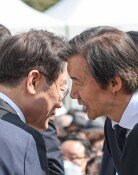NK People Openly Complain Over `150-day Battle`
NK People Openly Complain Over `150-day Battle`
Posted September. 16, 2009 05:42,
Lee Seon-hee (pseudonym), a 30-something housewife living in a provincial city of North Korea, gets angry when she looks back at the 150-day battle ending today.
The Norths economy seemed to improve little over the past 150 days, but she was under much stricter control for the sake of the battle.
The most puzzling and annoying thing that happened over the 150 days is that authorities forced people to remove the windows on their balconies. Only two years ago, officials had ordered the installation of windows on balconies, claiming that it would raise room temperature four degrees and prevent dust from entering the room and make it cleaner.
Lee spent 52 dollars, an amount that her family of four can live on for a month and a half, to buy the window. She bought curtains for the balcony through a group purchase.
In less than two years, however, she was ordered to get rid of the window again.
The people complained but got just a short reply: the order was intended to beautify the city. Some living in Lees apartment complex purchased an aluminum window frame for more than 100 dollars.
Many households had put tile on their balconies but then have to remove it and recoat the balcony with lime mortar. These things occurred in all North Korean cities, and those who lost a huge sum of money were outraged.
That did not stop here. Another order came on putting five potted plants in balconies without windows. Community representatives used to shout Clean your house! or Sell stuff at 6 a.m. but a smaller number of them now say, Take out potted plants!
In North Korea, people raise cactuses rather than flowers. Lee binds her cactus with artificial flowers and put it in the balcony. When the wind blows, potted plants often fall.
Lee has no idea that the Chosun Shinbo, the official newspaper of the pro-Pyongyang Chongryon (The General Association of North Korean Residents in Japan), wrote an article saying all cities and villages in the North will be refurbished in a few years and the face of the country will change greatly.
She also has no clue that South Korean media reported that a major change like the Souths Saemaeul Undong (new village movement) is taking place in the North. She simply blames capricious officials who make her build and remove her window in the balcony.
Over the 150-day battle period, more people were recruited for projects and officials collected more money from each household for what they claimed was project assistance.
Control teams also combed through apartments. When a resident opened the door, officials picked a fight and demanded bribes.
When Lee hears someone knocking on her door, she keeps silent.
Lee, however, learns that there is something that even the Norths ruling Workers Party cannot do. A good example is the balcony. Officials first asked the people to remove fences on the first floor. After residents banded together to protest the idea by citing prevention of theft, the plan was scrapped.
Before the 150-day battle began, a list of banned products was posted on the market. Almost all items available were on the list, but after people protested, all goods are being freely traded.
Until July, controllers stood on streets monitoring and making fun of women wearing pants. Lee had to wear a skirt when helping a farming project or riding a bicycle. As more women grew angry, authorities allowed them to wear pants last month.
The changes were driven by the peoples complaints. No complaints were made openly against high-level officials, however.
One big reason is that once an offender is caught, his or her family members will be taken to places unknown, but the bigger reason is that people want to blame officials for their suffering.
Lee says to people, There are bad guys who try to annoy people by telling them to take out potted plants, dont wear pants, and sour relations between the Workers Party and the public. This is what she truly thinks. Recognizing this, authorities openly punished a number of officials for corruption allegations over the 150-day battle period.
The battle period ends today but the North Korean people remain gloomy because of the announcement of a 100-day battle from Sept. 23 through Dec. 31. North Koreans are worrying again about what will happen.
zsh75@donga.com







